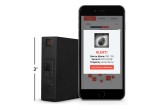Delta Five Highlights Green Approach to Prevention and Early Detection During Bed Bug Awareness Week

Raleigh, NC , June 6, 2017 (Newswire.com) - Delta Five is the inventor of a new Automated Insect Monitoring System that has a proven 98 percent success rate at detecting bed bugs and other insects while preventing pest encounters. This year for Bed Bug Awareness Week, Delta Five is focusing their efforts on public health for the prevention and early detection of bed bugs. Bed Bug Awareness Week, launched by the Professional Pest Management Alliance, reminds the public to be on guard against bed bugs in time for the summer travel season.
The Center for Disease Control (CDC) and the Environmental Protection Agency (EPA) released a joint statement on bed bug control. The report noted that while “bed bug populations dropped dramatically during the mid-20th century, the United States, among other countries, has been seeing an alarming resurgence of bed bugs.” Research shows there has been an increase of seven to 15 percent each year. While the exact cause of the rise isn’t known, research suggests that the ineffectiveness of pesticides against bed bugs, a general lack of awareness about treating bed bugs, and an increase in international and domestic travel are all contributing factors.
"Despite these quarterly treatments our fielded systems were still detecting and trapping bed bugs, roaches, fruit flies, and carpet beetles, among other insects. Research is showing that the typical pesticide regimens may be not only bad for the environment and harmful to people and companion animals, but also ineffective and a waste of money."
Dr. Jason Janet, CEO of Delta Five
The joint statement also notes that bed bugs can cause negative physical and mental health issues as well as economic consequences. Some people can have mild to severe allergic reactions to the bites, which can also lead to secondary infections of the skin such as impetigo, ecthyma, and lymphangitis. Cases of bed bugs may also affect the mental health of people living in infested homes.
Furthermore, the EPA warns that “many pesticides may pose some risk to humans, animals, or the environment because they are designed to kill or otherwise adversely affect living organisms.” This risk can grow significantly with the inherent variability in pesticide application and composition. Risks may also grow with proximity—head boards, for example, are often doused with chemicals and/or dust, meaning that pesticides are placed extremely close to humans’ brains, eyes, ears and lungs.
Early detection is clearly key to prevent bed bug infestations, the risks they inherently pose, and the risks preventative and reactive pesticide treatments may pose to public health.
Dr. Jason Janet, CEO of Delta Five, noted that a single case of bed bugs in one hotel room can have a devastating, rippling effect on both hotel staff and guests. He notes that while it will impact both guests and staff at the hotel, bed bugs can also be carried with them to other locations including their own home residences. While hotels typically embrace a quarterly chemical prevention, it’s been shown to be ineffective by Delta Five’s own field research conducted with property owners and management.
“Despite these quarterly treatments our fielded systems were still detecting and trapping bed bugs, roaches, fruit flies, and carpet beetles, among other insects. Research is showing that the typical pesticide regimens may be not only bad for the environment and harmful to people and companion animals, but also ineffective and a waste of money.”
After years of development and field validation, Delta Five released their Automated Insect Monitoring System. This is the first and only 24/7, safe, Wi-Fi-enabled bed bug solution for hotels, single-and multi-family properties, assisted-living facilities, call centers, waiting rooms, cruise-ships, and more. Discreet and compact, the Automated Insect Monitoring System provides unprecedented early detection of pests including bed bugs, and other bedroom and store-room insects. Most important, the system is organic and chemical-free, protecting the health of people and the environment.
The system is also compact and easy to use. It attaches easily to out-of-sight surfaces and provides remote 24/7 monitoring with real-time notification. It utilizes an all-natural, odorless lure to attract bed bugs and other insects, which are noticed by the device’s internal cameras that, in turn, activate the traps. The WiFi enabled system immediately notifies users via email or SMS. Users can simultaneously track thousands of sites, view images of captured pests and see alerts on the Delta Five dashboard. Because the system traps the insects, disposal is also easy.
Delta Five has created a true green real solution in the prevention of bed bugs infestations through early detection. To learn more about Delta Five’s Automated Insect Monitoring System, visit DeltaFive.com.
About Delta Five
Delta Five is innovating hospitality as well as property-and pest-management with automated technologies that enhance guest and resident satisfaction, while boosting business profits and reputation. For more information, visit DeltaFive.com.
Source: Delta Five


